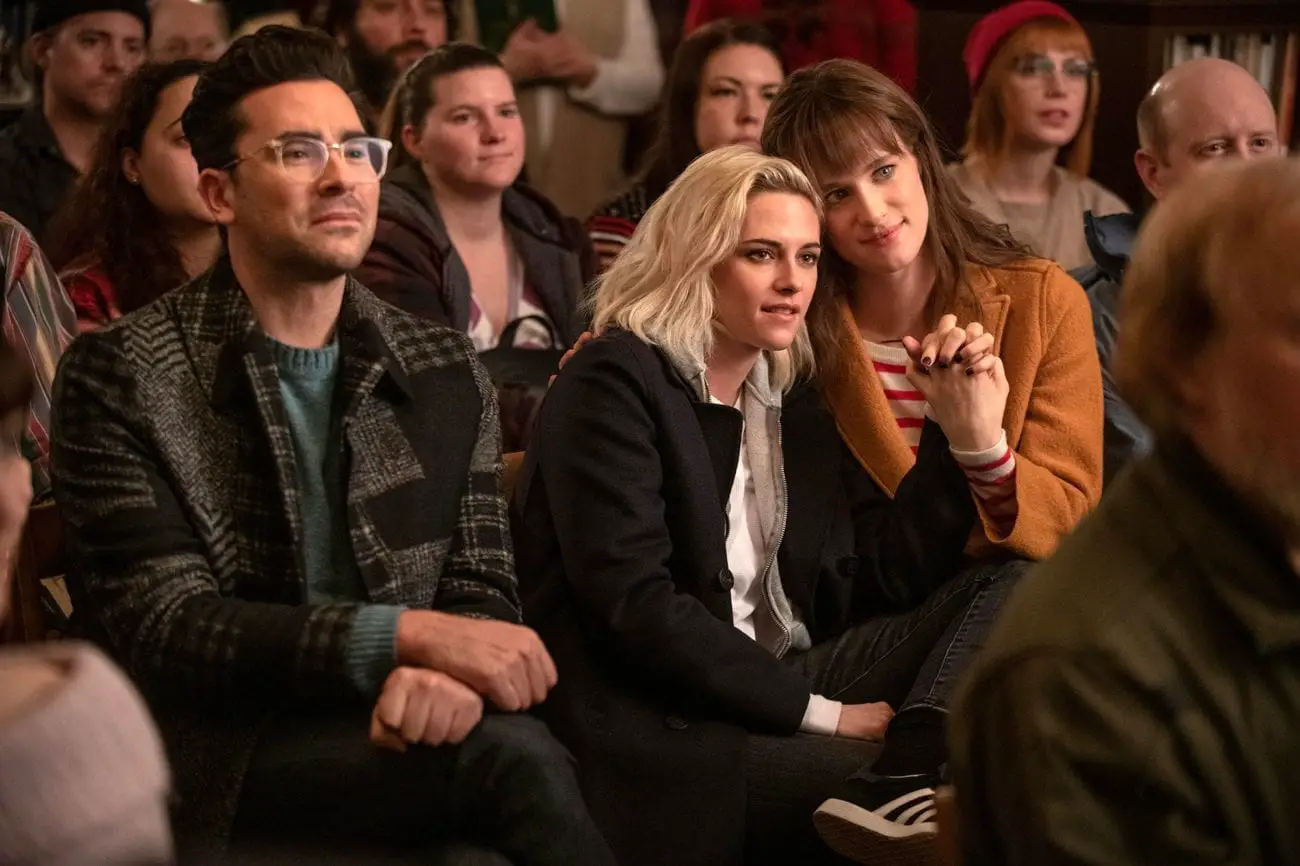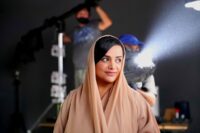Happiest Season
I have never come out to my family as non-binary or bisexual. Not because I fear what their reactions would be – there were gay friends around as I grew up – but precisely because it never has felt necessary. I’m lucky enough not to have to worry about how they might react, although years later my brother still has a hard time accepting my vegetarianism. Though I do feel it’s an awkward conversation that will involve a lot of questions that I’d rather avoid. In all circumstances, I hate being put on the spot. I thought it best to mention all this because one’s own response to a film is always going to depend heavily upon your relationship to the themes it focuses on. In light of what I’ve just said, perhaps it’s clear why in the case of Happiest Season, I was, despite some misgivings about the film, so moved.
The film follows Abby (Kristen Stewart) who has for the first time been invited by her girlfriend Harper (MacKenzie Davis) to accompany her home for Christmas, only to be blindsided to discover that not only is Harper’s family horrible (most synopses characterise them as ‘conservative’ but honestly, they’re mostly just terrible people: spoiled and insufferably bourgeois, more than once Get Out was summoned to mind), but that Harper hasn’t told them she’s a lesbian. Abby concedes to pretend their relationship is platonic, however, she begins to have misgivings about their relationship as the depths of Harper’s aversion to telling her family the truth become clear and as she must suffer the brunt of her silence.

Although Abby is very much the lead, it is also an ensemble piece. Abby does have her own small arc to go on, but mostly it’s Harper and her family who need to grow and change. It actually seems unusual that Abby is the protagonist, as it’s really Harper who needs to step up and do right by her girlfriend. Many have criticised the film because Abby is forced to put up with so much on Harper’s behalf that the relationship starts to feel legitimately tested. Likely a version of this same story told from Harper’s perspective would succeed in making her character more sympathetic, as it’s certainly true that the majority of the film is made up of Harper being extremely inconsiderate and unfeeling towards her lover. You just feel incredibly sorry for Abby and really want someone to start treating her properly. The fact Aubrey Plaza exists as a potential rival to Abby’s affections doesn’t help matters either.
I do think this aspect of the film could have been fixed if we had been given more scenes at the start of Abby and Harper interacting as a couple. It’s a common flaw with a lot of relationship-under-duress movies that we don’t get enough time to invest in the relationship while it’s working. However, much as I align with this perspective of the characters, I don’t consider it too fatal of a flaw with the film. The fact audiences feel so strongly for Abby and root for her so much, is a strength and is part of what makes the film’s third act in particular so powerful and moving. For once, you genuinely find yourself questioning how much is too much to ask of someone who loves you, and the fact we’re seeing the story play out from the perspective of the one being asked makes those questions all the more provocative.
Loving someone isn’t just about what’s going on inside, but about how much you are willing to give and to risk, and how much work you are prepared to put in to make sure that person is happy to be with you. How invested you find yourself getting while watching Happiest Season is testament not only to the emotional strength of the writing, knowing exactly which buttons to press and how far, but also to Stewart’s phenomenal performance. Happiest Season does feel like one of the most genuinely romantic films in recent memory, though I’m not sure that that’s not just because it left me more in love with Kristen Stewart than ever.
The whole cast do give excellent performances though, with Dan Levy being another standout as the gay best friend archetype, though here played with both genuine wit and pathos. Davis is always an actor I like to see more of and she does give a strong dramatic performance here too. Meanwhile Alison Brie, Victor Garber and Mary Steenburgen all give turns that manage to be odious without feeling truly irredeemable or totally unsympathetic. How each of their particular brands of awfulness were instilled in them by their respective upbringings is clear. Mary Holland also has some of the best comic moments as the one innocent family member, the dorky, attention starved Jane, though the only truly likable characters here are the queer ones.
Director Clea DuVall manages to strike a strong balance between the cosiness of the archetypal ‘Christmas movie’, utilising many familiar tropes of the genre, while also harnessing them to tell a disarmingly emotionally investing and engaging story. Some of the moments of slapstick comedy do feel forced, but that in itself feels like a traditional element in the Christmas movie formula. Perhaps at times Happiest Season even feels too raw and too real for festive fare, but its message of honesty and forgiveness feels entirely apt for the Christmas season.
Blue Is the Warmest Colour
When I, as an eighteen-year-old boy (as I was at the time) would say one of my favourite films was Blue is the Warmest Colour, those who had heard of it would always titter knowingly. It’s unfortunate that so much of the attention and controversy the film attracted focused so keenly on the explicit sexual content, to the exclusion of almost everything else in the film. It must be conceded that the backlash wasn’t totally unearned. With stories circulating around the director’s conduct on set and the harsh filming schedule, it’s appropriate that questions were asked. Nonetheless, it is unfortunate that the film’s one major misstep in the form of an overly long and poorly shot sex scene was the focus of so much of the attention it received. The extensive use of handheld closeups in the scene was an excellent choice, bringing the viewer into a very real intimacy with the characters, however, interspersing these shots with long shots staged like an erotic tableau seems misguided, as not only are these shots voyeuristic (and not purposively so, as in The Handmaiden), but also dispel the scene’s intimate feel.
A lack of real, familiar eroticism has long been an issue I’ve had with many heterosexual movie romances, as it’s only natural that the most intimate moments between two characters should be an important part of any portrait of a relationship, but the filming and inclusion of the scene, with which there are certainly issues, probably harmed the film more than it aided it. This is indeed a shame, because underneath these surface issues, there is, in Blue is the Warmest Colour, one of the most emotionally investing coming of age stories in all of cinema.
The film’s French title La vie d’Adèle, is perhaps a more telling description of the film and its goals, endeavouring less to be a portrayal of a typical lesbian relationship (a belief in which I think many of the criticisms of its ‘unrealistic’ portrayal of lesbian sexuality is rooted) and more to be an epic journey of self-discovery for its young protagonist. The course of Adèle and Emma’s relationship is less determined by their real love for one another – though that is certainly manifest throughout – but through their respective intentions for who Adèle is to become. Adèle Exarchopolous gives a monumental performance as Adèle, as she transforms from a gawky, insecure teenager into a fully fledged young woman before the viewer’s eyes. Lea Seydoux is equally fantastic as her live-wire lover and the two make for one of the most viscerally real romantic relationships of any kind put to film, one of the rare examples of a near-three-hour movie that I don’t think is nearly long enough.

I’m aware Blue is the Warmest Colour has its detractors and I’m aware of their reasons, many of which I sympathise with. However, nothing could ever diminish the fact it was an extremely formative film for me personally. I certainly loved the film when I first saw it—I had initially intended to watch it in two halves, but was unable to stop thinking about it and go to sleep until I had seen the ending—but I was perhaps unaware at the time how parts of myself were being awoken even as I watched it. There is a scene early on where a girl in Adèle’s class carelessly and flirtatiously kisses her, only to guiltily reject her the next day when the initially shaken Adèle unexpectedly reciprocates. I found in this scene, this moment of longing for acceptance, of a fleeting instant of optimistic belief that you might have found it, only to realise it was all a lie, something so soul-shakingly moving, that it connected with me on a level I wasn’t remotely prepared for.
It was a long road from there to understanding why I had been so moved by Blue is the Warmest Colour, and one fraught with insecurity as I felt my feelings towards the film dismissed as mere heterosexual fetishism aroused by the film’s eroticism. Sexual desire is a place we all feel particularly vulnerable and which can find us at our most exposed and our most selfish, but through that, it is somewhere that our most core emotional needs are laid bare and I do hope the wrong lessons are not learned from the backlash the film received. We need films about love, and love in a recognisable form that feels true to each of us.
There’s no one Queer experience that any single movie can put onscreen, but as Queer people the things we say and do and the ways we express our feelings and ourselves are fraught with a sense of political criticism that often comes from within. As necessary as those acts of criticism are, they can be exhausting at times. It’s in variety and range of perspective that real truth is found. It’s in honest personal details that artists make themselves vulnerable and it’s in those moments of vulnerability that we audience members find ourselves most affected. Art has the power to transform not only who we are as a culture but how we feel about ourselves, and this is why representation is so important. It not only allows us to discover that we are not alone, but who we are in the first place.



